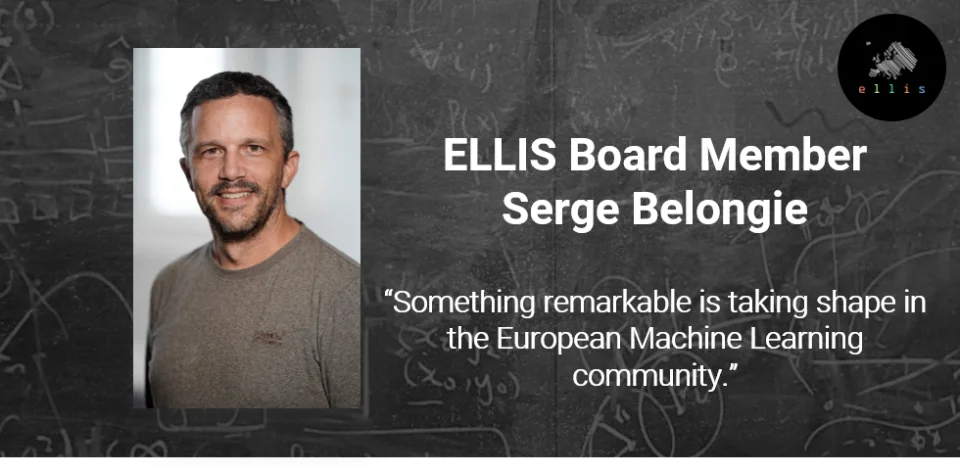



ELLIS Member Profile: “Something remarkable is taking shape in the European Machine Learning community”
A renowned scientist who became aware of the ELLIS initiative at an early stage is ELLIS board member Serge Belongie. Looking back at an exceptional scientific career in the US, Serge Belongie moved to Denmark in summer 2021 where he currently works as a Professor of Computer Science at the University of Copenhagen and heads the Pioneer Centre for Artificial Intelligence. His decision to continue his career in Europe was significantly influenced by the opportunities the ELLIS network poses.
In this interview he talks about the role ELLIS played in his move to Denmark, and the differences he perceives between AI research in the US and Europe.
After a very successful research career at top universities across the US you decided to move to Denmark where you currently work as a Professor for Computer Science. Comparing the conditions for AI research in the US and Europe: Do you perceive any differences?
Serge Belongie: “First, some similarities, based on my experience at US universities (Caltech, Berkeley, UCSD, Cornell) and as a faculty member in Europe (University of Copenhagen, and part of the ELLIS network): In both cases, I find I have access to a remarkably talented pool of international students and postdocs, brilliant colleagues, a stimulating research environment, and opportunities to attend more conferences, workshops, and meetups than can fit on anyone’s calendar.
In terms of differences, the first one that comes to mind is that Europe has fewer individual ‘rock star’ universities, and you’re less likely to find our faculty giving talks with TED-style headset mics and grand hand gestures. The Kardashian Index of European faculty on Twitter is, on average, much lower than our counterparts in the US. Researchers in Europe engage in more cross-institutional collaboration. PhD programs are shorter here, since students generally enter the program having completed a two-year Masters. People actually take time off on holidays. And there are a lot of holidays!
There are also some more complex points of comparison. Both the US and Europe have vibrant startup scenes – Europe has hubs in places like Berlin and Stockholm that are hard to beat – but when a company starts to reach a certain size, the pull of Silicon Valley is often hard to resist. Both the US and Europe cultivate academic-industry connections, but in the US sometimes the borders disappear, whereas in Europe the terms of engagement (for example with industry PhD programs) are better defined. Europe has a bit of a ‘hall monitor’ reputation due to highly visible regulatory initiatives such as GDPR, but in practice, Data Privacy is a topic of great interest to researchers in both the US and Europe.”
ELLIS played an important role in your decision to move to Europe. Why?
Serge Belongie: “When I started to ponder a possible move to Europe, a former colleague remarked that I’d have a nice life-work balance, but I’d ‘fall off the face of the earth’. I saw where he was coming from, but the first thought that came to mind was ‘I don’t think he knows about ELLIS!’. At the time, ELLIS was still a baby, but it was already turning heads in the US with a very appealing PhD program that featured cross-institutional co-advising and an already very impressive map of CV, ML and NLP researchers. I knew several members of ELLIS’s founding team going back to the mid 1990s, and I highly respected their academic careers and was consistently impressed with the PhDs and postdocs coming out of their labs. Combining this with the opportunity to start an AI research center in Denmark, I decided it was time to take the plunge.”
In the meantime you are a member of the ELLIS board. In this role you help define the network’s strategy. What would you like to achieve with ELLIS in the coming years?
Serge Belongie: “ELLIS has a good problem on its hands: It’s reaching the end of its beginning phase with a thriving, enthusiastic set of research units across Europe and Israel. The establishment of ELLIS institutes is the next major step which is already underway and which will further help us attract outstanding talent to Europe. Funding has been secured for a first institute in Germany, and discussions for additional sites in Europe are ongoing, including in Denmark. But the success of ELLIS brings with it organizational growing pains. I joined the board in the midst of a transition, witnessing a small team of incredibly hard-working faculty and administrative staff juggling too many balls at once.
To address this, we have begun the roll-out of a new, distributed organizational structure, one that will allow the ELLIS board to focus on strategic issues. For example, Generative AI methods like ChatGPT, Stable Diffusion and DALL·E are on everyone’s minds these days, both in terms of technical aspects and societal implications. In a couple years, perhaps the hot topic will be AI-enabled Augmented Reality glasses. In my role as an ELLIS board member, I aim to contribute to roadmaps for advanced research proposals with positive societal impact, advise policy makers, help recruit top talent to Europe, and improve communication channels with the public.”
One of the main objectives of ELLIS is to train the next generation of AI researchers and to attract the best young talent to Europe. What advice would you give to young researchers from around the world seeking a career in AI research?
Serge Belongie: “If you’re curious about studying in Europe, but don’t know much about the opportunities here, my advice is simple: Take a look at https://ellis.eu/members. The amount of talent in that lineup is astounding. Then reach out to students in the ELLIS PhD program. Ask them about their experience: the research opportunities, the quality of life, the diversity of opportunities. Something remarkable is taking shape in the European Machine Learning community, and ELLIS is an excellent focal point for young researchers to explore opportunities for world class research here.”
About Serge Belongie
Serge Belongie received a B.S. in Electrical Engineering from the California Institute of Technology in Pasadena and a Ph.D. in Electrical Engineering and Computer Sciences from the University of California in Berkeley. From 2001 - 2013 he was a Professor in the Department of Computer Science and Engineering at the University of California in San Diego, followed by a position as a Professor in the Department of Computer Science at Cornell University and a position as Associate Dean at Cornell Tech. His research, for which he received numerous prestigious honors, includes fields such as Computer Vision, Machine Learning, Crowdsourcing and Human-in-the-Loop Computing. He is also the co-founder of several companies including Digital Persona, Anchovi Labs and Orpix. Currently, Serge Belongie works as a Professor of Computer Science at the University of Copenhagen where he also leads the Pioneer Centre for Artificial Intelligence. In addition to that, he serves as a member of the ELLIS board.
Learn more about Serge Belongie’s work here and follow him on Twitter, Mastodon and LinkedIn.
Social media

